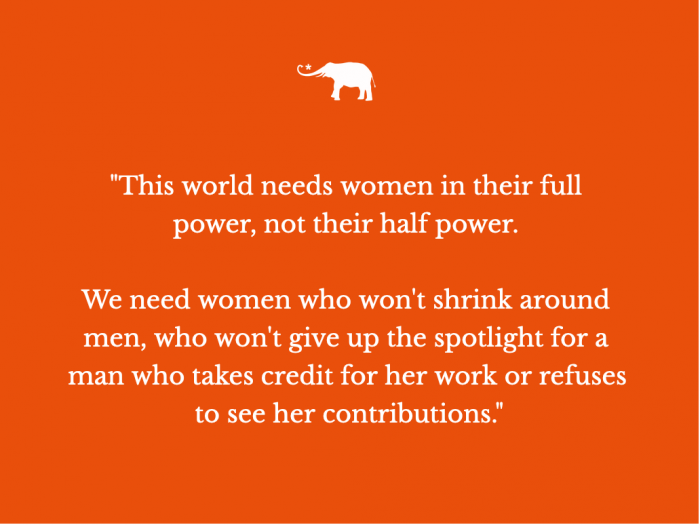“When is it we get recognized for our contributions?” I asked him.
“When you start to take responsibility for yourself,” my male boss answered.
I was absolutely and fully confident in my abilities to “take responsibility,” my contributions simply weren’t being seen or recognized.
Red-hot pokers shooting through my chest and head, I wanted to scream at him:
“Are you f*cking kidding me?”
My heart started beating faster as I carefully hid my fury, burying my emotions under a laugh and a head tilt.
I smiled at him, unconsciously “softening” the words I was about to speak.
With a laugh, I said:
“You’d be pressed to find someone else taking more responsibility for their work than I am.”
Light, fun, and playful. Covering up powerful, strong, and confident.
Being a female means shrinking to make men a bit more comfortable. And we often aren’t even aware that we are participating.
Women, do we see how we shrink, even the tiniest amount, to let men get bigger? Do we see how we fold our arms in, cross our legs, and collapse through our shoulders?
Can we feel how, with just a shift of our body language, we’re letting men take up more space and how we give up ours? Do we notice how we start ending our sentences in an upswing or soften the tone of our voices ever so slightly?
Are we aware of how often we “let” men provide solutions that we have already thought of or hold back the expression of what we actually need?
We smile, even when we are presenting strong opinions. We defer, even when we know the answer. We continue to engage in the conversation, even when a man has demeaned or condescended to us.
Likely, we barely recognize we’re doing this because we are so cultured into it. For a lot of us, it’s pure instinct and muscle memory.
As I debriefed the meeting in a fury later with a female colleague, she told me I smiled a lot, a fact that was so far below my conscious awareness that I didn’t even know I was doing it.
Men are encouraged to be “problem solvers” in our culture. From the outset, males are heard, and their voices are respected as valid, important, and authoritative. Women are taught to submit.
Our voice pitch is generally higher, our body stature more diminutive. So we typically physically look “up” to men, and their voice carries a deeper resonance. It’s automatic signaling for “power over.”
Men are acculturated to have reduced emotional content in their spoken and written material, while emotions, in our society, are seen as hysterical, vulnerable, and needy unless they are tools to be “vulnerable” to a man or “nurturing.” Emotions are welcome when they are in service but otherwise are seen as lesser—weaker.
Men often listen to the words of a female and automatically provide solutions: ones we didn’t ask for, didn’t want, and, if we are grown adults, probably don’t need.
Women out-educate men.
Women have higher emotional intelligence.
Seventy-five percent of women are in the workforce.
We are intelligent, experienced, secure, and competent. We probably don’t need a man’s unsolicited suggestions for how to solve for things we haven’t sought solutions for.
Yet we pretend we do, and in doing so, our demeanor shifts. We smile more, laugh more, tilt our heads more.
We do not do this around other women.
Men, I know you think she’s powerful already. She’s probably what you might playfully call a “handful.” But I’m going to tell you something about her you don’t know and haven’t yet seen: she is far more powerful when you are not in the room.
You should see what I see.
She carries a whole different vibe. When she’s not worried about upsetting or exhausting you or trying to sidestep your wounds, she speaks her truth without adjusting her volume or tone. Not caring whether she is perceived as attractive or not, she doesn’t feel the need to couch her language in smiles or in “maybes” or “I think.”
This is how she speaks to me.
To me, she speaks her truth. She tells me what I need to know. She keeps me honest. She holds me to my word. She makes me look at the whole situation. She is intelligent, experienced, and has her own solutions. She is capable and confident. And she does all this without feeling the need to smile or amend her language.
Females in a room together aren’t “nurturing” one another. We aren’t making meals and sweeping the floor for one another in cute outfits and saying, “Honey, can I get you anything?”
We are expressing our truths. The truths that are uncomfortable but need to be told.
Marianne Williamson says that our greatest fear is of our own power. But perhaps this could be adapted to say that it’s not so much our power we’re afraid of. What scares women most is being witnessed by men while embodying our full power.
I recently had the experience of asking a man direct questions:
“Can you explain what you mean? I don’t understand your perceptions.”
This challenge is still culturally unwelcome.
He didn’t speak to me for days.
This direct communication and the resulting punitive action is our very worst fear.
We were taught that expressing ourselves was dangerous. And it was.
But we need to do it.
We need to do it because this world needs women in their full power, not their half power. We need women who won’t shrink around men, who won’t give up the spotlight for a man who takes credit for her work or refuses to see her contributions.
We need women who don’t take a backseat to any of the men in her life but sit next to them as equals. We need women who can help men develop the emotional skills they need by asking the same questions that help women develop their capacities for the same.
I first learned to do this as a mother. I had to stop worrying about whether a male doctor or teacher was checking out my ass and start making him listen to my words. I had to become a fighter, an outspoken advocate for these two beings who couldn’t advocate for themselves. I had to roar on behalf of my children.
After that, I started doing it for myself, too. These days, I don’t tell myself I should “pick my battles.” If it’s a violation, then it’s a battle worthy of being fought. I don’t worry about his ego because if he can’t take care of it, that’s his problem.
All I tell myself is that I am a person worthy of being heard, listened to, and addressed with respect. We all are.
So, we can practice as mothers. We can practice as businesswomen. As partners and friends and spouses.
We can practice by speaking to men the same way we speak to other women:
>> With full curiosity.
>> With challenging questions and intellectual dialogue meant to help both listener and speaker grow and confront truths.
>> By demanding consent and making clear whether we are venting, or soliciting opinions, or seeking advice.
>> By honoring our own ability to make decisions as adults, not children who need “protecting” or providing for.
Rooting this behavior out from our bodies is like trying to unlearn how to ride a bike. How do you unlearn behavior that has been trained into our bodies and psyches for thousands of years?
The only way to change this dynamic is to recognize it in ourselves. We must start to notice how, ever so slightly, we soften ourselves and our presentation the moment a man enters the space.
We must learn not to care if men stonewall us or take space from us in protest. If we collectively require more from men, they will have nowhere to go—no refuge where they can be surrounded only by female caricatures: those who “nurture.”
We need to be conscious of how often we are flirting with men. How often we are holding back our truths out of fear that they will stonewall us or otherwise punish us for speaking. We need to be mindful of our body language: are we crossing our legs or curling into little balls to become physically smaller?
We must watch for how we conduct microaggressions toward ourselves as we defer, as we make ourselves into submissives and “less than.”
We must look for how our bodies participate in “power over” structures and retain our stance, our tone, and our words.
We’re not here to shrink our curiosity or demand less of ourselves and others.
We’re not here to be agreeable, or accommodating, or easygoing.
We’re here to be our fullest, most soulful, expressive selves wherever we are and whomever we’re around.
I let the man who stonewalled me take his space. He hasn’t reappeared to talk it out. And it doesn’t bother me one bit.









Read 62 comments and reply